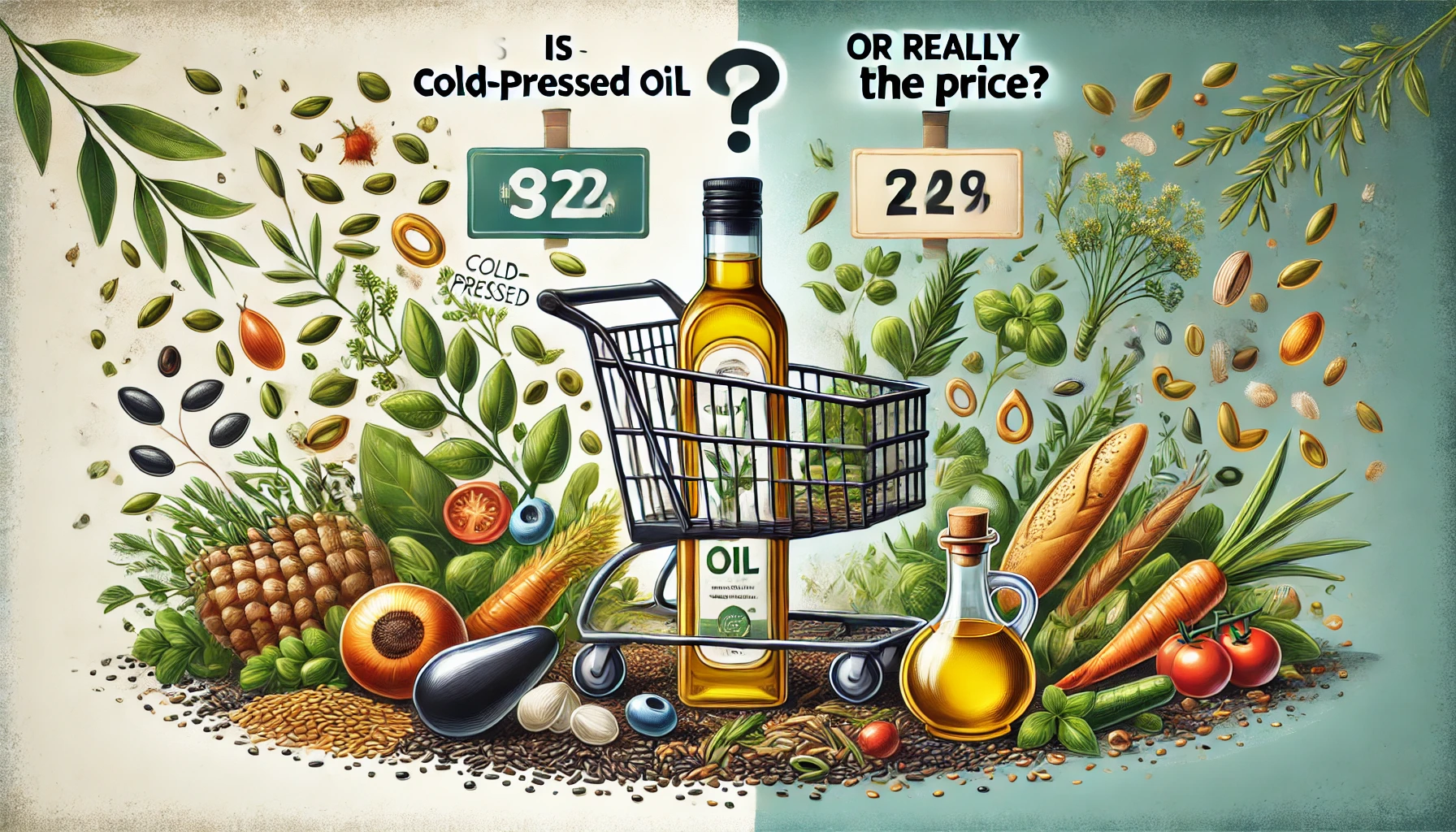- You have no items in your shopping cart
- Subtotal: ₹0.00

Is Cold-Pressed Oil a Marketing Gimmick or Cold-Pressed Oils Are Worth the Price?
In today’s health-conscious world, more people are making deliberate choices about the food they consume, and oils are no exception. If you’ve ever stood in a grocery store aisle staring at rows of cooking oils, you’ve likely noticed a range of prices—from the affordable, refined vegetable oils to the premium, cold-pressed oils that can cost significantly more. The difference in price is striking, but so is the difference in quality.
Many people find themselves wondering: Is cold-pressed oil really worth the price, or is it just another marketing gimmick aimed at health-conscious consumers? In this blog post, we’ll dive into the key differences between cold-pressed and refined oils, explore the benefits of cold-pressed oils, and help you decide whether their higher price tag is justified.
What is Cold-Pressed Oil?
Cold-pressed oil, also known as wood-pressed or Marachekku oil in parts of India, is extracted using traditional methods that don’t involve high heat or chemicals. This process involves pressing seeds, nuts, or fruits with mechanical pressure, which keeps the oil’s natural flavor, nutrients, and properties intact. Because the oil is extracted at lower temperatures, it retains essential vitamins, minerals, and antioxidants that are often lost during the refining process of commercial oils.
The process of cold-pressing dates back thousands of years, and even today, it is considered one of the purest ways to extract oil. Some of the most commonly cold-pressed oils include groundnut oil, sesame oil, coconut oil, and olive oil.
On the other hand, commercially refined oils undergo high heat, chemical solvents, and deodorization to extract maximum oil yield. This method sacrifices nutrients and often results in an oil that’s lower in flavor and less beneficial for health.
Why Are Cold-Pressed Oils More Expensive?
There are several factors that contribute to the higher price of cold-pressed oils, and these reasons go beyond just marketing strategies:
- Yield: The cold-pressing process yields less oil compared to high-heat extraction methods used for refined oils. Since more raw material is needed to produce a smaller amount of oil, the cost per liter increases.
- Traditional Methods: Cold-pressed oils are often extracted using manual or slow-speed machines, which are labor-intensive and time-consuming. This method requires more care and effort, which translates into a higher cost for consumers.
- No Chemicals or Additives: Cold-pressed oils don’t contain artificial chemicals or preservatives. The pure, unrefined nature of these oils often means they have a shorter shelf life, making them more expensive to produce and store.
- Higher Nutritional Value: Since cold-pressed oils retain their natural nutrients, they are often seen as more valuable from a health perspective. The process preserves vitamins like A, E, and K, as well as essential fatty acids and antioxidants, which add to the perceived value and, therefore, the price.
- Small-Scale Production: Cold-pressed oils are often produced in smaller batches compared to commercially refined oils. Small-scale production requires more oversight and careful attention to quality, which increases production costs.
What Makes Cold-Pressed Oils Worth the Price?
Although cold-pressed oils come with a premium price tag, there are several reasons why they are worth the investment, especially when it comes to your health:
1. Retained Nutrients and Antioxidants
One of the key benefits of cold-pressed oils is their ability to retain the natural nutrients present in the source material. During the cold-pressing process, the oil is never heated above a certain temperature (usually around 120°F or 49°C), ensuring that nutrients like vitamin E, vitamin K, and essential fatty acids remain intact.
Vitamin E, for example, is a powerful antioxidant that protects your body from harmful free radicals, reduces inflammation, and supports healthy skin. In contrast, high-heat refining methods used in commercial oils often destroy these nutrients, leaving you with an oil that’s lower in quality.
2. Health Benefits
Cold-pressed oils are packed with health benefits that refined oils often lack. Here are some notable examples:
- Cold-Pressed Sesame Oil: Rich in omega-3 and omega-6 fatty acids, sesame oil is beneficial for heart health. It contains sesamol, a natural antioxidant that can help lower cholesterol and prevent atherosclerosis.
- Cold-Pressed Coconut Oil: Packed with medium-chain triglycerides (MCTs), coconut oil is known for boosting metabolism, supporting brain health, and aiding in weight loss. It also has anti-inflammatory properties that can benefit the skin and digestive system.
- Cold-Pressed Groundnut Oil: High in healthy monounsaturated fats, groundnut oil can help improve heart health, lower bad cholesterol levels, and provide essential nutrients like vitamin E and antioxidants.
- Cold-Pressed Olive Oil: Known for its ability to reduce inflammation, lower cholesterol, and improve heart health, olive oil is rich in polyphenols, which protect the body against oxidative stress.
The combination of these beneficial properties makes cold-pressed oils not only a great addition to your diet but also an excellent choice for overall health and wellness.
3. Free from Chemicals and Additives
Commercially refined oils often undergo chemical treatments to increase yield, improve clarity, and enhance shelf life. These oils are treated with hexane (a petroleum-based solvent) and may contain additives to preserve their shelf life or improve their flavor. Cold-pressed oils, on the other hand, are extracted without the use of harsh chemicals or solvents, making them a much purer option.
By choosing cold-pressed oils, you’re consuming an oil that is free from harmful chemicals and artificial additives, ensuring that you’re putting only the best, most natural ingredients into your body.
4. Rich Flavor and Aroma
One of the most noticeable differences between cold-pressed oils and refined oils is the flavor and aroma. Cold-pressed oils retain the natural flavor and fragrance of the source material, making them a perfect addition to salads, dressings, and dishes where the oil’s taste is highlighted. For example, cold-pressed sesame oil has a nutty, robust flavor, while cold-pressed coconut oil has a rich, tropical aroma.
In contrast, refined oils are often stripped of their natural flavors and aromas during the refining process, making them more neutral but also less appealing from a culinary perspective. This rich flavor profile of cold-pressed oils can enhance the taste of your dishes, adding depth and complexity that refined oils cannot offer.
The Downside of Commercially Refined Oils
While cold-pressed oils offer numerous health benefits, commercially refined oils often have the opposite effect. Here’s why refined oils might not be as good for your health:
1. Loss of Nutrients
The refining process subjects oils to high heat, bleaching, and deodorizing, which destroys most of the oil’s natural nutrients. The oils are also stripped of their flavor and color to create a more neutral product. While this makes refined oils versatile for cooking, it also means you’re missing out on the vitamins, antioxidants, and healthy fats that are present in cold-pressed oils.
2. Trans Fats and Hydrogenation
Refined oils are sometimes partially hydrogenated, a process that turns liquid oils into solid fats to improve shelf life. This process creates trans fats, which have been linked to an increased risk of heart disease, stroke, and type 2 diabetes. While many food manufacturers have removed trans fats from their products, partially hydrogenated oils can still be found in certain processed foods.
3. Chemical Residues
As mentioned earlier, refined oils are often treated with chemicals like hexane during the extraction process. Although these chemicals are removed before the oil is packaged, there is concern that trace amounts of these solvents may remain in the final product, posing potential health risks.
Is the Price Difference Justified?
While it’s true that cold-pressed oils are more expensive than their refined counterparts, the health benefits and nutritional value they offer make them worth the investment. Here’s why the price difference is justified:
- Healthier fats: Cold-pressed oils contain more monounsaturated and polyunsaturated fats, which are essential for heart health and overall well-being. Refined oils, on the other hand, are often high in saturated fats and trans fats.
- No chemicals or additives: Cold-pressed oils are free from harmful chemicals and additives that are commonly found in refined oils. This makes them a purer, safer option for cooking and consumption.
- Retained nutrients: Cold-pressed oils retain essential vitamins, minerals, and antioxidants that are lost during the refining process. This means you’re getting more nutritional value for your money.
- Flavor and quality: Cold-pressed oils have a richer flavor and aroma, making them a better choice for dishes where the oil’s taste is highlighted.
In short, while cold-pressed oils may cost more upfront, their health benefits and superior quality make them worth the price.
How to Choose the Right Cold-Pressed Oil for You
If you’ve decided that cold-pressed oils are worth the investment, it’s important to choose the right type of oil for your needs. Here are a few tips to help you make the right choice:
- Consider your cooking methods: If you’re going to be cooking at high temperatures, opt for oils with a higher smoke point, like cold-pressed coconut oil or groundnut oil. For low-heat cooking, dressings, or drizzling, oils like olive oil or sesame oil are great choices.
- Look for quality: Not all cold-pressed oils are created equal. Make sure to choose oils that are organic, unrefined, and free from additives or preservatives. Look for reputable brands that prioritize quality over quantity.
- Start with small quantities: Cold-pressed oils tend to have a shorter shelf life than refined oils, so it’s best to buy them in smaller quantities. Store them in a cool, dark place to preserve their freshness.
- Check for certifications: When buying cold-pressed oils, look for certifications like FSSAI or USDA Organic, which indicate that the oil has been produced using high standards of quality.
Conclusion: Cold-Pressed Oils Are Worth the Price
At the end of the day, cold-pressed oils offer a range of benefits that make them worth the higher price tag. From their nutrient retention to their pure, unrefined nature, cold-pressed oils provide a healthier, more flavorful alternative to commercially refined oils. Whether you’re looking to improve your heart health, boost your immune system, or simply enjoy better-tasting food, cold-pressed oils are a worthwhile investment.
If you’re ready to make the switch, consider trying the range of cold-pressed oils available at GheeStore. From cold-pressed groundnut oil to cold-pressed sesame oil, GheeStore offers high-quality oils that are produced using traditional methods to ensure the best flavor and nutrition. Shop today and experience the benefits of cold-pressed oils for yourself!



